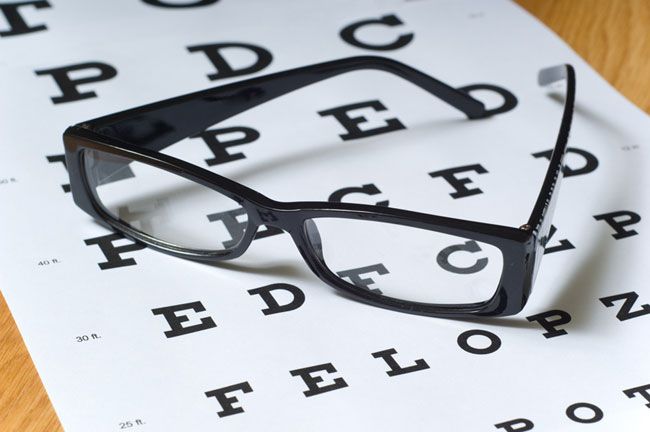When you've had poor vision for as long as you can remember, the thought of fixing it can seem both too-good-to-be-true and more than a little scary. When you use you eyes as we all do, every second of every day, it's enough to make you nervous – but .
"My first consultation with Mr Allamby was very quick and simple," one patient, Will, recalls to HELLO! of the experience. "He checked my eyes and declared me suitable for treatment and spoke to me about the success rate and risks. He told me that their success rate was 100% - nobody had ever not left with 20/20 vision. The odds seemed great but I have to admit I was still nervous."
Patients can't believe they will literally never wear their glasses again
Two weeks later, heart in his throat, he returned to Mr Allamby’s Focus Clinic in London. "I really was quite nervous," Will admits. "They clamp your eyelids open and it's not like any other procedure where you can just avert your eyes. There's no hiding! Everyone in the room was very reassuring though and were clearly used to people being a bit anxious. When they do the initial incision, cutting the outer layer of your eye, you see a bright light and then it goes black which is slightly unnerving I have to admit. But they talk you through it the entire time, and you know it's supposed to happen.
"Then you have to concentrate on one blue light for about 10 seconds, ignoring the few red ones around the outside of your field of vision. But that’s literally it. There's no pain - the uncomfortable part is the feeling of pressure - that lasts for 20 seconds and they count you down, second by second. And it really is as quick and simple as that."
After his second eye had been operated on, Will was allowed to look about. "You sit up and you can literally see, it's really weird - but amazing!" he says. "It's a little hazy, they put you in a dark room for 15 minutes and then that’s it – off you go. There's this sign outside the room which looks like an eye test sign which you're shown on the way in. On the way out they get you to look at it again and it says, 'I could not read this 20 minutes ago'. It's crazy."
MORE: How to treat this summer's most common ailments
While the experience and anxiety about the procedure left Will feeling a bit shocked, the results have been worth every minute of worry. "I was very tired when I got home – I think it was just the stress, so I went for a nap. And when I woke up I couldn’t believe it. I could still see perfectly. It's been utterly lifechanging. Being able to see from the moment you wake up is the weirdest – and most wonderful - thing."
The process is only uncomfortable for twenty seconds
Of course Will's pre-op concerns about the procedure – not to mention his subsequent euphoria – are very common when it comes to LASIK eye surgery. So we sat down with his surgeon, Mr Allamby, to answer some of the most common questions potential patients may have. Here's everything you need to know about laser eye surgery:
What kinds of vision problems can be fixed by laser eye surgery?
We can treat most short-sighted prescriptions and correct mild to moderate amounts of long-sightedness. We can also help many patients who suffer from presbyopia, which is the requirement for reading glasses in middle age, with our LASIK Blended Vision procedure, or alternatively refractive lens exchange.
Which conditions are not suitable?
Some conditions affecting the immune system, including rheumatoid disease, SLE (systemic lupus) and other so-called collagen vascular diseases will likely block you from having laser eye surgery. Having said that, if you are not suitable for laser eye surgery, there are sometimes lens-based techniques, for example, refractive lens exchange (RLE) or an implantable contact lens (ICL), that may still be an option for you.
Is the treatment permanent or does the effectiveness wear off?
Your surgery should last many years - it's a common myth that your surgery will 'wear off'. Studies show most patients still have excellent vision a decade after treatment. At our clinic, we also give short-sighted patients a ten-year guarantee on their surgery.
Is the process painful?
Contrary to popular belief, laser eye surgery is not painful. It may be uncomfortable, but only for a very brief period. On the day of your vision correction, you will have your eyelids gently held apart, so you can’t close them, although from the patient's point of view it feels as though you are still blinking. The surgeon will use anaesthetic eye drops to numb the eye, so you don't feel pain. The discomfort or pressure sensation will last for about 20 seconds per eye, and you’ll need someone to drive you home and let you rest up for the remainder of the day. Most patients find they have a little discomfort for the first four hours after surgery; then their eyes return to normal. And it’s important to remember that the whole procedure takes just eight or nine minutes to treat both eyes.
What are the potential side effects?
Most people get some degree of temporary eye dryness in the first three to six months after laser eye surgery. Others can report some night vision issues, such as glare, halos and star-bursting of light. Your eyes need time to heal and may feel dry and itchy after surgery, but this will soon pass, and eye drops will relieve this too.
How do you deal with anxious patients?
The majority of patients are slightly nervous on the day of the procedure, which is normal, and most surgeons are experienced in being able to relax patients and get them engaged in the actual process. Very occasionally, perhaps just three or four times a year, the patient is sufficiently anxious that we prescribe a mild anti-anxiety drug before surgery. However, most patients can manage perfectly well without a sedative. Some people worry about blinking, or sneezing, during the surgery - but there isn't anything the patient can do that will upset the process or affect the result, which people find very reassuring.
What are the best reactions you have received in the years you've been performing this procedure?
We get a lot of tears - and in a positive way. A lot of our patients have lived with poor sight for a long time and to have it corrected almost instantly can be quite an overwhelmingly-positive experience. Don’t tell my partner, but I've had a few kisses, too! One lady with a severe prescription even exclaimed, 'You're like a God!' I'm not sure about that one, but it was a nice compliment, that’s for sure.
Is it important to do your research and go to a reputable doctor?
Absolutely. In laser eye surgery, the lasers are in fact only active for around 10% of the total duration of the procedure. The bulk of the operation - 90 per cent - is done manually by the surgeon. That is why it is imperative you choose a highly experienced specialist, as he or she is the one in full control. Some clinics offer slightly cheaper surgery, which involves the surgeon manually cutting the eye with a scalpel to create the corneal flap, as opposed to using a laser. But it's an old and rather outdated technique and not one to be recommended. Do plenty of research and don’t be lured in by cut price offers.











